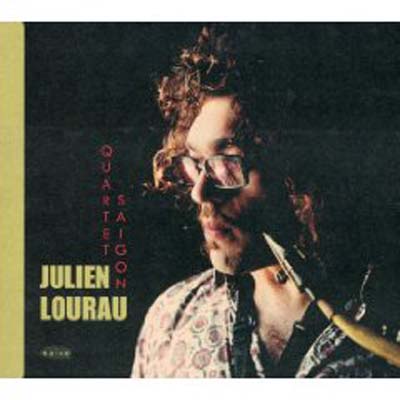
by Ian Mann
January 29, 2010
/ ALBUM
Exciting, convincing contemporary acoustic jazz.
Saxophonist Julian Lourau was born and bred in Marseilles where he still lives. He grew up listening to a wide range of influential saxophone players among them Sonny Rollins, Sidney Bechet, Steve Lacy, Julius Hemphill and Stanley Turrentine. Stylistically they’re a diverse bunch that perhaps come together in Wayne Shorter, still Lourau’s primary influence. Certainly elements of Shorter’s style can be heard in Lourau’s own playing and the Frenchman cites Shorter’s classic “Speak No Evil” as the model for his own work.
Since coming to prominence in the early 90’s Lourau has worked with the groups Trash Corporation and Groove gang and has toured with Marc Ducret, Henri Texier, Abbey Lincoln, Vincent Courtois, Magic Malik, Jeff Sharrell and Ari Hoenig. He is a regular collaborator with Paris based pianist Bojan Z whose album with his own Tetraband “Humus” is reviewed elsewhere on this site.
“Quartet Saigon” features another of Lourau’s keyboard partners the pianist Laurent Coq. The two have worked together for twenty years and divide the compositional credits equally on “Quartet Saigon” with five tunes each. The closing track is a version of Burt Bacharach and Hal David’s “A House Is Not A Home” that slots in perfectly with the mood of the rest of the album.
The quartet take their name from the city in which they first played in 2007. The New York based Thomas Bramerie (double bass) and Otis Brown III (drums) complete the line up and the group has toured extensively since it’s beginnings. The album was recorded in December 2008 and is a good summation of the group’s abilities. Much of the music features Lourau’s probing but frequently lyrical soprano as on his own “Diaspora” which opens the record. There are plenty of interesting musical ideas on this album with Coq making a particularly strong contribution. This is exciting, convincing contemporary quartet jazz.
Coq’s “Walking On Water” begins as a beautiful ballad and features some delicate ensemble work before Lourau’s soprano takes flight engendering a sudden change of pace. The piece ends with the leader’s soprano dancing ecstatically as the rest of the band seamlessly respond to the change of mood.
Lourau’s “Saigon”, effectively the title track, is presaged by “Saigon Intro” a passage for Bramerie’s fluent solo bass. The halting theme is sketched by Lourau on soprano and his playing increases in intensity as the track unfolds, constantly shifting up and down the gears.
Also by Lourau “Angels"initially has the feel of a ballad but like so many of these compositions quickly develops into so much more. There is a feature for the articulate bass of Bramerie and both front liners contribute strong solo statements, Lourau again taking off on soprano in the tune’s closing stages. Brown too is featured as a soloist showing off his abilities in an unexpectedly exuberant solo.
The album basically divides into a Lourau written half and a Coq written half. Lourau’s final contribution with the pen is “Baron Samedi” which gives the composer a chance to demonstrate his considerable chops on the tenor in a powerful display of blowing. Coq’s solo is angular and percussive and Bramerie and Brown lay some down some busy,energetic grooves. It’s the most resolutely full on piece on the album to date.
After the earthy blowing of “Baron Samedi” Lourau demonstrates the tender side of his tenor playing on Coq’s lovely ballad “Nico”. Whether it’s a tribute to the former Velvet Underground chanteuse I wouldn’t like to say. It certainly sounds completely different to Acoustic Ladyland’s piece of the same name.
Coq’s intriguing “Around The Corner” is full of tumbling cadences and tricky time signatures. Highly rhythmic it’s a thoroughly absorbing listen throughout it’s eight minutes with Lourau on tenor and with the composer in sparkling form at the piano.
The joyous “Worship” incorporates plenty of high octane tenor blowing and some inventive and energetic drumming from Brown. Bramerie features strongly in the quieter middle sections with composer Coq holding it altogether from the piano.
“Cinquecento” marks a return to gentler, more lyrical territory before the quartet’s arrangement of “A House Is Not a Home” brings the album to a close. Introduced by Lourau’s unaccompanied tenor this is very much a showcase for the leader who plays beautifully. I’m less keen on the insistent drum pattern that emerges a couple of minutes in and hangs around for the rest of the piece with precious little variation.
Not that this should detract from what is a very fine album overall. Both Lourau and Coq are imaginative, colourful writers and their tunes are full of good ideas. The playing is of a high standard all round with the leader emerging as a hugely talented all round saxophonist, highly proficient on both his chosen horns with his soprano work just getting my vote by a short head, although it’s a close run thing.
Lourau brings the Saigon Quartet to London’s Vortex Jazz Club for two nights (8th and 9th February 2010) to launch the album. On the evidence of the recorded work these are two gigs that should be well worth seeing.
blog comments powered by Disqus